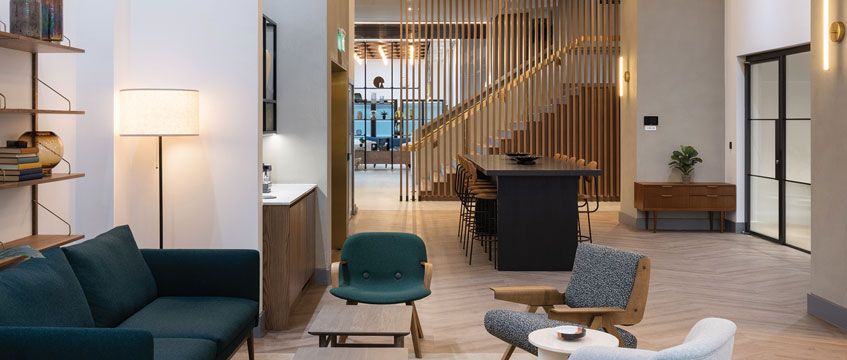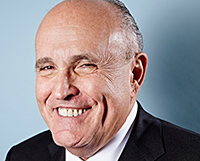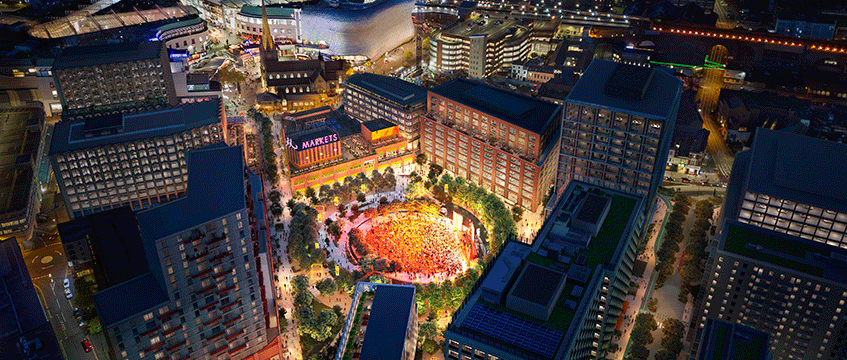When the Twin Towers fell in New York, the city’s then, and arguably still best-known, mayor, made one of his most defiant promises: to put the iconic Manhattan skyline back together. Because, says Rudy Giuliani, there is little that matters more to a city than the shape it casts against the horizon. The right skyline, he believes, acts not only as a totem in the face of adversity but a sign of health, wealth and ambition when times are good. It is, in effect, the metropolitan lifeblood.
“It shows the character of a city. The creativeness of a city. It shows the growth,” he says, a strong, staccato New York accent – accentuating each point. “If a city isn’t constantly rejuvenating itself, it’s beginning to die. People get annoyed sometimes by all the construction and all the new building, but that’s the lifeblood of a city. That’s what’s creating the future.”
And it is this point about skylines, he adds, that applies just as much to London as it does to that of the city with which his name is synonymous.
Today, gesturing towards a slightly less familiar vista, from the 35th floor of his law firm Bracewell & Giuliani’s London office in , mayor Giuliani speaks exclusively to Estates Gazette about what defines a modern world city and what it takes to run one.
NY-LON
Giuliani has an energy that would shame many half his age. The 70-year-old has flown in overnight from Boston, where he had delivered a speech before boarding the plane. He barely had time to review his diary before he was back on stage at lunchtime with Boris Johnson in a good-natured London versus New York debate raising money from the Mayor’s Fund for London.
After a brief mid-afternoon cigar-stop – some stereotypes are true – he sits down for this interview before heading off for a series of client meetings, a dinner and then on to Warsaw. Despite the relentless schedule, he cuts a relaxed figure, willing even to look on the bright side of the good old London gridlock.
“It took us an hour and 15 minutes to get here from the airport. Even at 6.30am the traffic is immense, but that’s a good problem to have. If you have no traffic, you’re in deep trouble and your city is falling apart.” He adds that a crowded city is a growing city – a concept he is hardly alien to coming from NYC. And it is this background knowledge of one of the most ambitious, fast-paced cities in the world that make his views on the current state of play in London – arguably New York’s only serious global rival – so intriguing.
“When I go to a city, one of the ways I judge it is by how much building is going on,” he says. “Driving around London now it’s exciting to see all the construction. What that tells you is that the next 10 years are going to be good. The city is rejuvenating rather than retrenching.”
And while Giuliani may believe that New York remains the capital of the world – “If you don’t love your city more than any other, well, then it shouldn’t be yours” – he says that London is one of the few others where he could see himself living. Somewhere he feels comfortable.
It helps that he is an admirer of Boris Johnson, perhaps seeing in London’s mayor a little of the colour he himself brought to New York in the late 1990s. “Boris is a very activist, creative mayor. I love to see that, having done that job myself and knowing how difficult it is. And also knowing how new your office of mayor is. He is really helping to define that role.”
Making it as mayor
This, of course, is very much the case. Johnson is making his own unique mark as one of London’s first elected mayors. But it was Giuliani who arguably wrote the handbook on what it takes to be effective in the role. He demonstrated the power of picking a policy that will make a difference and sticking with it. In his case, tackling crime. He became synonymous with the idea that no one should be a more visible advocate for your home turf. And should adversity strike, as it did in New York in 2001 in the most horrendous way imaginable, lead from the front.
So, given that protocol demands he is still addressed as mayor Giuliani, what is his formula for being an effective city leader today?
Well, there is personality, something where Boris Johnson arguably has him pipped to the post. “Yes, I think it’s helpful if a mayor is colourful like your mayor is. Your mayor has a big personality. I think to be a successful mayor of a big city, you have to, so people can relate to you,” he says.
But for Guiliani this is just the tip of the iceberg. “You have to be a darn good administrator because hundreds of problems are being presented to you every week,” he says. “I would start the day as mayor of New York and by the end of the day I’d faced three problems I’d never even thought of.
“You need to be a good executive,” he adds. “Know how to manage. Know how to run things. Know how to inspire people. This is particularly important if you’re the mayor of a big city where public relations is important and communications is important and dealing with the media is important.”
Diversity and global knowledge
He goes on to touch on diversity and global knowledge – two crucial points as the world gets smaller and people become increasingly mobile. “When you look at a city like London and a city like New York, we both have such diverse populations. You’ve got representatives of people from all over the world. And on that point you also need pretty good knowledge of global issues and foreign relations. You have to understand all of this to relate to the people in your city.”
A natural knock-on to air travel and airports follows. After all, it is unlikely he would have sounded so accepting of his snail’s pace journey into London, or New York for that matter, in a meeting with his city transport officials 15 years ago. “The great world cities of the future are going to be cities that have very good airports,” says Giuliani, who is still an active campaigner for a new hub in New York in addition to Kennedy, Newark, and La Guardia.
“The better the airport, the more your city is going to grow because this is the way we travel now. If you think about cities, cities exist because of ease of transportation. London exists because of the river. New York exists because of a river. They’re two different rivers, but they’re enormously important. So, now we don’t travel by ship the way we did. We don’t even travel as much as we used to by rail. How do we travel? We travel by air.
“So, if your airports are good, if your airports are keeping up with the demand, then your city is going to keep growing. When your airports start to become too crowded or when your airports start to become too difficult to access, then people start thinking about going to other cities.
“So, if you’re thinking about London in the future, you’ve got to be thinking about another airport. Heathrow is a great airport, but it’s a really crowded airport. If you could develop some alternatives, it would really help.”
Instinctively, he backs Boris Island. “These airports are going to have to be located in different places so the traffic doesn’t become horrendous.”
Giuliani still has much to offer. Boris hasn’t asked him for advice, he says, but plenty of others have – Bogota, Buenos Aires, and Rio are recent beneficiaries. And he hasn’t ruled out running for political office again, though when it comes to being a mayor, he’s “done that”.
With his ambition – and his defiance – undimmed, there will be another chapter.
Economic expansion: creating global opportunities
Giuliani may have flown in as the special guest for the Mayor’s Fund for London lunch but Boris Johnson wasn’t going to let him get off lightly. The mayor of London’s barb was the sharpest in the London-versus-New-York debate. “The reality is,” said Boris, “that the proudest creation of London is the United States of America – the system of law and liberty, and habeas corpus, and virtually everything else.”
But in truth London versus New York feels a little outdated looking at the decade ahead; the west versus the east may be more appropriate as an era-defining contest.
“I was actually in Shanghai with Bill Clinton and we both were amazed at the skyline of Shanghai and how it has grown,” says Giuliani. “Those Asian cities are a lot of the cities of the future, but that’s a good thing. I mean, the more the world economy expands, the better it’s going to be for all of us, the better it’s going to be for the UK, the better it’s going to be for the US because we’re so invested in the world economy. So, it isn’t really a sense of competition. They’re not going to take anything away from us. They’re actually going to create opportunities for us.”
It’s not just Asia, though, and this shift of wealth and power is one of the reasons why Bracewell & Giuliani has opened in the City. “London to a large extent is the economic hub for Europe and to some extent even for the Middle East and now for Africa. In the Middle East they’re very comfortable in doing a lot of their business deals under English law, which gives them a sense of security that they might not get under the laws of their own country. So an office in London is not just about doing legal work in London or England. It’s about doing legal work in Europe, doing legal work in the Middle East, and doing legal work in Africa.”











